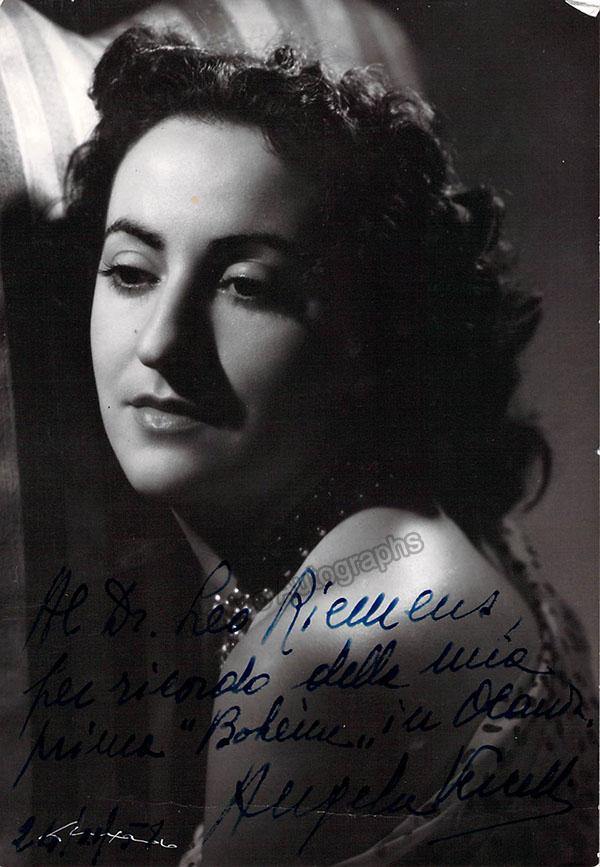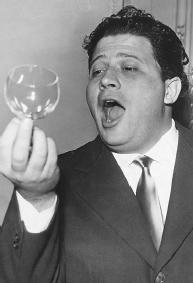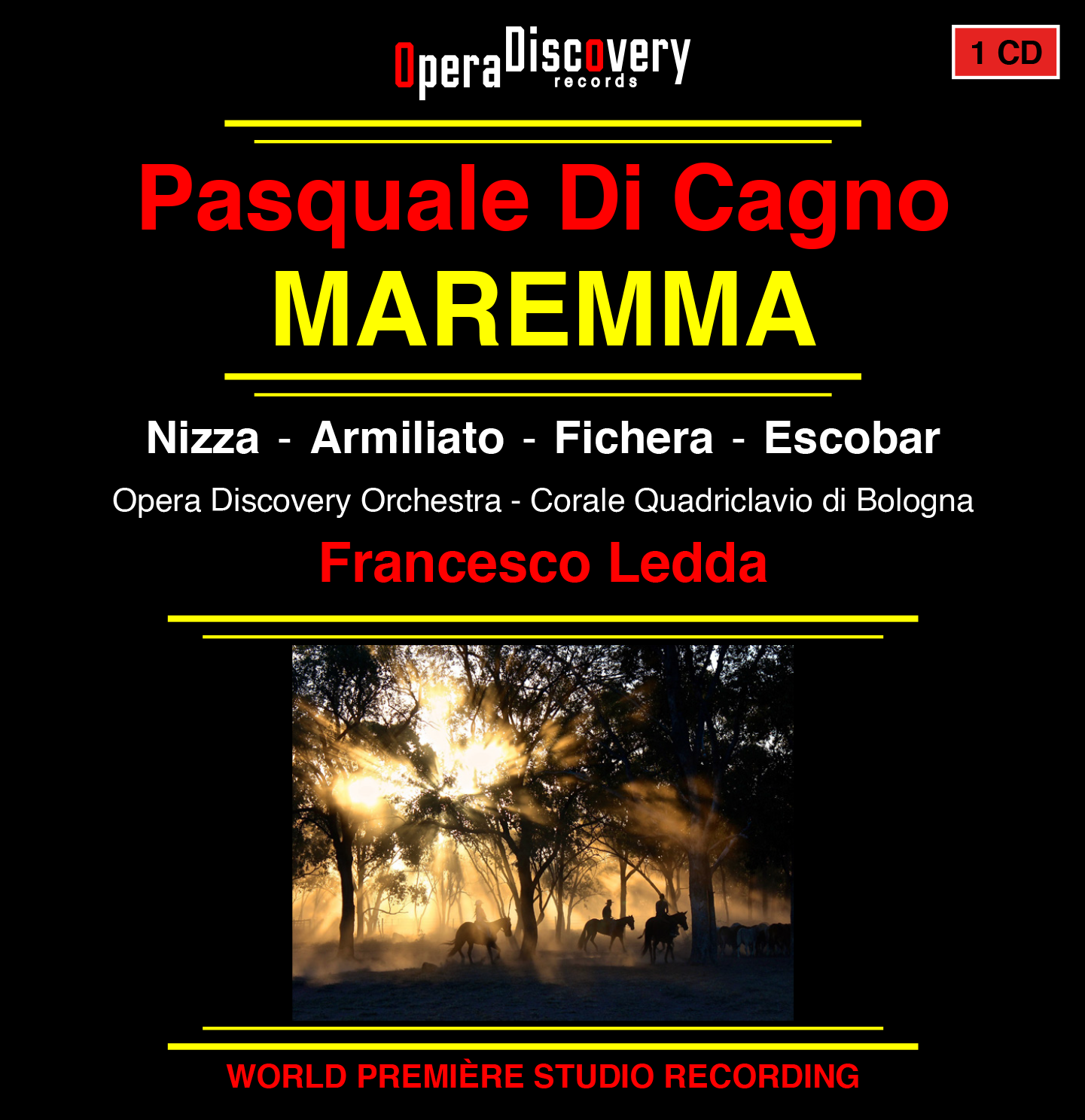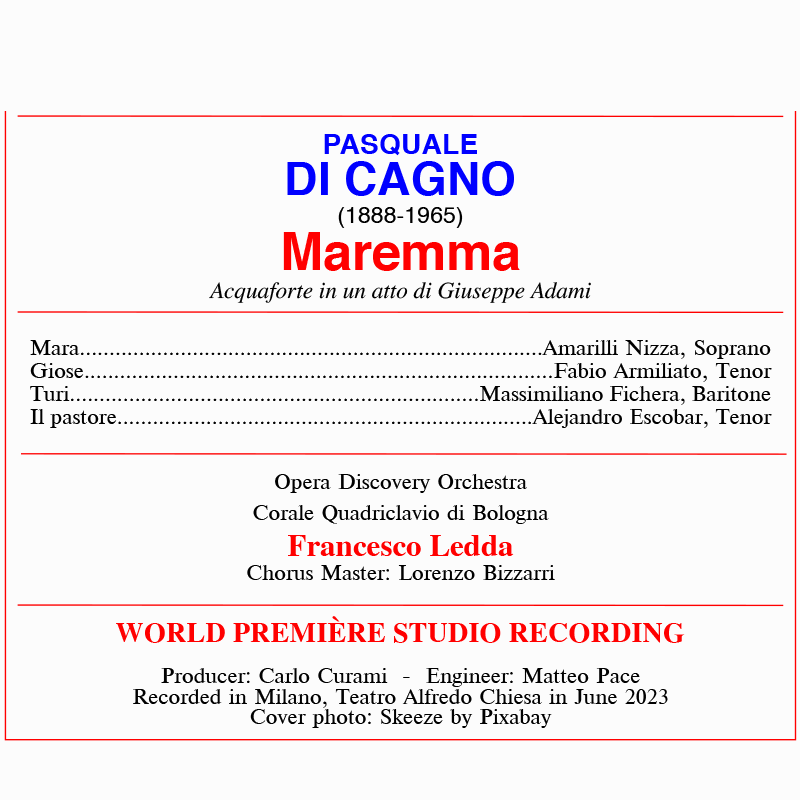Physical CD
€9,99
Tax included.
Shipping calculated at checkout.
Files in MP3 format
€4,99
Tax included.
Purchase includes the complete opera in MP3 format and the booklet files and Inlay Card sent to the indicated e-mail address.
Pasquale Di Cagno

Pasquale Di Cagno
Pasquale Di Cagno was born in Bari on 27 January, 1888. He was a child prodigy and already played the guitar at the age of four and the piano at the age of six. In 1911 he won a competition for a song with orchestral accompaniment. He moved to Milan in 1912 and attracted the attention of major composers such as Mascagni and Puccini. His first opera, Frida, was well received at the Teatro Petruzzelli in Bari in 1924 and at the Teatro di San Carlo of Naples in 1932. Toscanini wanted to produce Frida at La Scala, but was forced to leave Italy. Further operas include: Maremma, Passiflora and Ondina, which Di Cagno considered his masterpiece but never performed. His production includes an orchestral Suite in five movements, Chanson-Dance for voice and piano, Improvvisazione cromatica su tema di valzer and a Gavotta e scherzo. Pasquale di Cagno died in Milano on 27 October, 1965.
Giuseppe Adami

Giuseppe Adami
Giuseppe Adami was born in Verona on 4 February , 1878 and was an italian librettist and music critic, best known for his friendship and collaboration with Giacomo Puccini. He wrote for him the libretto of: La rondine, Il tabarro and Turandot. Adami also wrote librettos for other composers such as Riccardo Zandonai’s La via della finestra, Franco Vittadini’s Anima Allegra, Mulé’s La zolfara and Caltabiano’s La figlia di Jefte. After the death of Puccini, Adami published a collection of the composer’s letters and his personal recollections which was one of the earliest biographies of the musician. He wrote a second biography Il romanzo della vita di Giacomo Puccini in 1942 He died in Milano on 12 October, 1946.
Maremma

Teatro Petruzzelli in Bari
Urged by Puccini, who hosted him in his “La Tagliata” estate in Ansedonia, to write a work on the Maremma region and to use Giuseppe Adami as librettist, Pasquale di Cagno waited a few years before coming up with his project. The first draft of the work can be traced back to the period between 1929 and 1931. In that year Toscanini, who was a great friend of the composer, was assaulted by a group of fascist students in Bologna and decided to leave Italy. Di Cagno, notoriously anti-fascist, sent him a telegram of solidarity and decided, to avoid any problems to submit his work, entitled Maremma, at the Scala under the pseudonym of Costante Costanti. The ploy failed and the music sheet was rejected, as were the following ones, determining an authentic ostracism towards the Apulian composer’s music. Embittered, di Cagno withdrew from composing while remaining tied to the world of music. In the 1960s there was a sudden interest in his work which culminated in the first performances of the Maremma on Italian Radio in 1966 conduced by Pietro Argento with Angela Vercelli and Luigi Infantino then at the Teatro Petruzzelli in Bari in 1968. Unfortunately, the composer could not rejoice in their success because he had already died a few years previously.
Synopsys

Angela Vercelli
A grassy area near Ansedonia, in the Tuscan Maremma.
Late XIX century.
The story takes place near the ancient city of Ansedonia, in Maremma. Giose, a shepherd in love with Mara, killed the groom whom the old father Turi had destined for the girl.

Luigi Infantino
Trembling and insecure Mara joins him in the forest, led by a sheperd. Meanwhile Turi rushes to avenge the honor of his family. With the proud accents of the ancient patriarchs he claims the right to give his daughter a husband of his choice and deplores Giose’s violence. Enraged, Giose strangles him after a furious quarrel and apathetically concedes himself to the judgement and revenge of the community.


